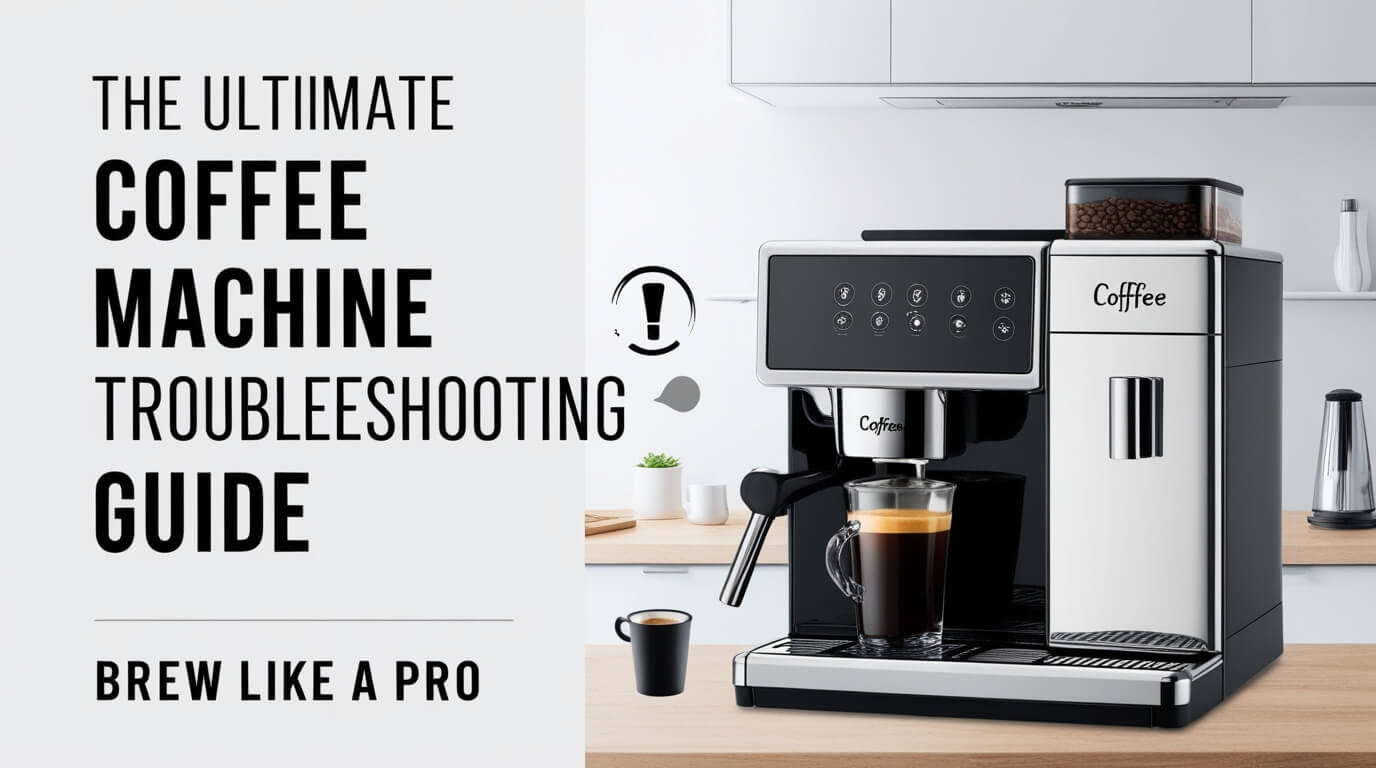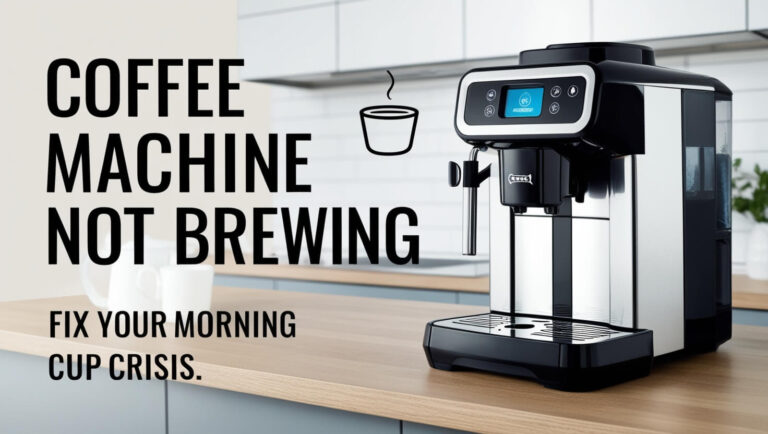
Is your coffee machine acting up? A misbehaving brewer can throw off your entire day. But don’t worry – many common coffee maker issues have simple fixes you can do at home. From power problems to odd tastes, this guide covers the most frequent coffee machine troubles. We’ll help you spot what’s wrong and get it fixed fast. Sometimes, you might need a pro, but often you can solve the problem yourself. Let’s get your coffee flowing again!
Types of Coffee Machines
Coffee machines come in various styles, each with unique features and potential issues:
- Drip coffee makers
- Espresso machines
- Single-serve pod machines
- French press
- Percolators
Knowing your machine type is the first step in effective troubleshooting. Each has its quirks and common problems, so familiarize yourself with your specific model.
Essential Components
Most coffee machines share these key parts:
- Water reservoir
- Heating element
- Pump
- Filter basket
- Carafe or cup platform
- Control panel
Understanding these components helps you locate the source of problems more easily. For example, if your coffee isn’t hot enough, you’ll know to check the heating element.
Common Coffee Machine Problems and Solutions
Let’s tackle the most frequent issues coffee lovers face with their beloved brewers.
Machine Not Powering On
A coffee maker that won’t turn on is frustrating, but often has simple solutions:
- Check the power cord and outlet
- Inspect for tripped circuit breakers
- Look for a blown fuse
- Verify the on/off switch isn’t faulty
If these steps don’t work, there might be an internal electrical issue requiring professional help.
Weak or No Water Flow
When your machine struggles to produce a steady stream of water, try these fixes:
- Clean the water reservoir and check for blockages
- Descale the machine to remove mineral buildup
- Inspect the water pump for damage
- Check and clean the water intake valve
Regular cleaning prevents most water flow issues, keeping your coffee strong and satisfying.
Inconsistent Brewing Temperature
Temperature problems can ruin your coffee’s taste. Here’s how to address them:
- Clean the heating element
- Check the thermostat settings
- Ensure the water reservoir is properly seated
- Verify the machine isn’t in energy-saving mode
Consistent temperature is key to extracting the perfect flavors from your coffee grounds.
Leaks and Drips
Nobody wants a puddle under their coffee maker. Try these solutions:
- Check all seals and gaskets for wear
- Inspect hoses and connections for damage
- Clean the drip tray and ensure it’s properly positioned
- Verify the water reservoir isn’t overfilled
Catching leaks early prevents water damage and keeps your coffee machine running smoothly.
Strange Noises During Operation
Unusual sounds can signal trouble. Here’s what to do:
- Check for loose parts or debris in the machine
- Inspect the pump for proper function
- Verify the water reservoir is correctly positioned
- Listen for air in the lines and prime the pump if necessary
A quiet coffee maker is a happy coffee maker. Address noises promptly to prevent bigger issues.
Poor Coffee Taste or Quality
If your coffee doesn’t taste right, consider these factors:
- Clean all removable parts thoroughly
- Use fresh, high-quality coffee beans
- Check water quality and consider using filtered water
- Ensure proper grind size for your machine type
- Verify correct coffee-to-water ratio
Great-tasting coffee starts with a clean machine and quality ingredients. Don’t compromise on either.
Espresso Machine-Specific Issues
Espresso machines have unique components that require special attention. Let’s look at some common problems.
Grinder Malfunctions
A properly functioning grinder is crucial for great espresso. Troubleshoot grinder issues by:
- Cleaning the burrs and removing any trapped beans
- Checking for worn or damaged burrs
- Verifying the grind settings are correct
- Ensuring the bean hopper is properly seated
Regular grinder maintenance ensures consistent, flavorful espresso shots.
Pressure Problems
Correct pressure is essential for espresso extraction. Address pressure issues by:
- Checking the pump for proper function
- Inspecting the group head for blockages
- Verifying the portafilter is correctly seated
- Ensuring the right grind size and tamping pressure
Proper pressure results in rich, crema-topped espresso shots that delight the senses.
Steam Wand Troubles
For perfect milk-based drinks, your steam wand must work correctly. Troubleshoot by:
- Cleaning the wand after each use to prevent milk buildup
- Checking for blockages in the steam tip
- Verifying proper steam pressure
- Inspecting the O-rings for wear or damage
A well-maintained steam wand creates silky, velvety milk for lattes and cappuccinos.
Preventive Maintenance Tips
Regular maintenance keeps your coffee machine running smoothly and prevents many common issues.
Daily Cleaning Routines
Incorporate these quick tasks into your daily routine:
- Wipe down the exterior
- Rinse and dry the drip tray
- Clean the portafilter and group head (for espresso machines)
- Purge the steam wand (for espresso machines)
- Empty and rinse the carafe
These simple steps prevent buildup and ensure your next brew is fresh and delicious.
Weekly and Monthly Maintenance
Set aside time for more thorough cleaning:
- Deep clean all removable parts
- Backflush the machine (for espresso machines)
- Clean the grinder (for machines with built-in grinders)
- Inspect seals and gaskets for wear
- Check and clean the water reservoir
Regular maintenance extends your machine’s life and maintains optimal performance.
Descaling Your Coffee Machine
Descaling removes mineral buildup that can affect taste and function:
- Use a commercial descaling solution or a vinegar-water mixture
- Follow your machine’s specific descaling instructions
- Rinse thoroughly after descaling
- Descale every 1-3 months, depending on water hardness and usage
Regular descaling keeps your machine running efficiently and your coffee tasting great.
When to Seek Professional Help
While many issues can be resolved at home, some require expert attention.
Signs of Serious Issues
Consider professional help if you encounter:
- Electrical problems that persist after basic troubleshooting
- Significant leaks or water damage
- Unusual smells or smoke from the machine
- Consistent under-extraction or over-extraction despite adjustments
- Repeated breakdowns or malfunctions
Don’t risk further damage by attempting complex repairs without proper knowledge.
Finding a Qualified Technician
To find a reputable coffee machine repair service:
- Check with the manufacturer for authorized repair centers
- Read online reviews and ask for recommendations
- Verify the technician’s experience with your machine type
- Get a written estimate before authorizing repairs
- Ask about warranties on parts and labor
A skilled technician can diagnose and fix complex issues, extending your machine’s lifespan.
Troubleshooting Tools and Resources
Equip yourself with the right tools and knowledge for effective coffee machine maintenance.
Essential Tools for DIY Repairs
Keep these items on hand for basic troubleshooting:
- Screwdriver set
- Cleaning brushes
- Descaling solution
- Microfiber cloths
- Food-safe lubricant
- Multimeter (for electrical issues)
These tools help you perform routine maintenance and simple repairs safely.
Helpful Online Resources and Manuals
Expand your knowledge with these resources:
- Manufacturer’s website for guides and manuals
- Coffee enthusiast forums for peer advice
- YouTube tutorials for visual guidance
- Coffee machine repair blogs for expert tips
- Local barista classes for hands-on learning
Continuous learning helps you better understand and maintain your coffee machine.
Conclusion
Mastering coffee machine troubleshooting ensures you’re never far from your next perfect cup. By understanding common issues, performing regular maintenance, and knowing when to seek professional help, you’ll keep your coffee maker in top condition for years to come.
Remember, a well-maintained coffee machine not only lasts longer but also consistently produces better-tasting coffee. So, put these troubleshooting tips into practice, and enjoy brewing like a pro every day. Your taste buds (and your wallet) will thank you for the effort you put into caring for your coffee companion.






